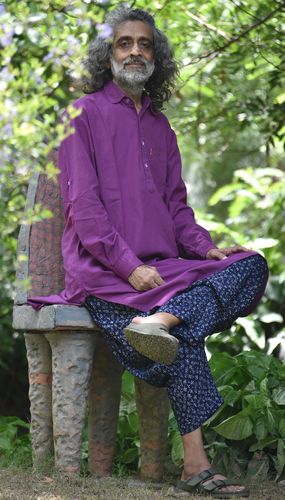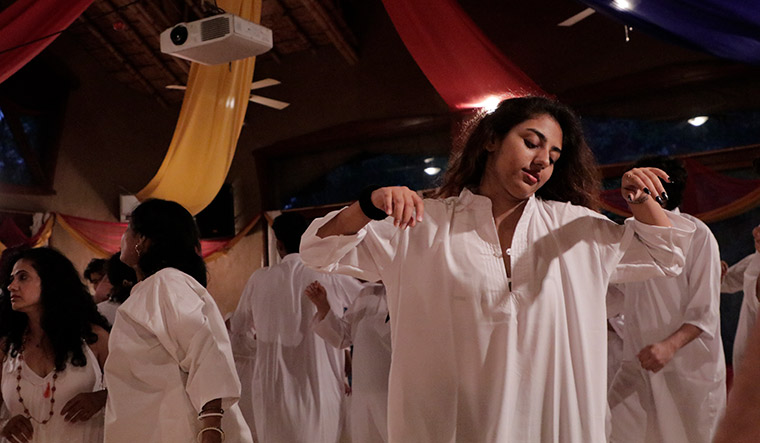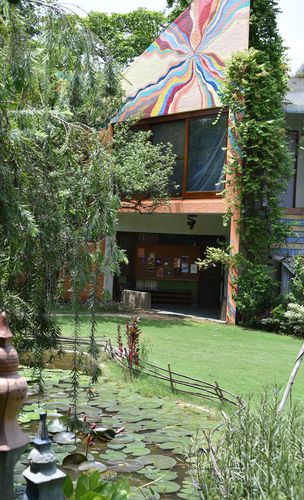In 1946, the book Zorba the Greek by Nikos Kazantzakis came out. Its protagonist, the charming and mysterious Alexis Zorba, espoused a life of exuberance and love, wining and dining, finding joy in the here and now. Sort of a wild sage. In 1982, Chandra Mohan Jain aka Osho coined the concept of Zorba the Buddha. A homo novus or new man, this Zorba is spiritual but also knows how to sing, dance and make love and money. Sort of a capitalist monk. No surprises then that Delhi-NCR’s 12-year-old wellness and well-being hub, Zorba The Buddha, is founded by Osho disciple Ashwin Bharti. Time once called Zorba the Greek “nearly plotless but never pointless”—an apt description for the eccentric Bharti, too.
Plonked on a double bed, with a mango-yellow mosquito net falling lightly over four bamboo poles (like a DIY four-poster bed), in his spacious, high-ceilinged hut-like abode called Osho’s Kutir, Bharti settles for an interview on a rainy Monday afternoon. “I like journalists. I had been media-shy. Now I am not. Probably it is useful,” he admits in his soft-singing voice. Mostly, he is browsing through WhatsApp messages, seemingly bubbling over with emojis. The minutes pass with the sound of birds chirping, peacocks screaming, streams running and the rains pattering before Bharti suddenly starts talking about his upcoming trip to Mongolia via China. His infrequent sentences are often bookended by the words “with Osho’s grace”.
At Zorba The Buddha, there are no plaques or pictures paying homage to the spiritual guru and leader of the highly controversial Rajneesh movement, vividly captured in the blockbuster documentary Wild Wild Country. Spread over three acres with rolling hillocks, meandering ponds and quaint wooden huts retrofitted with modern amenities, Zorba The Buddha resembles a cross between an eco-resort and a luxury spa. Except that its offerings go far beyond cookie-cutter yoga and meditation sessions to include new-age healing. Take, for instance, soul painting, where participants are blindfolded to the accompaniment of meditative music and made to choose colour palettes and a paintbrush. The abstract shapes oozing on the canvas in a state of trance are decoded for participants to gain insights into their mind and soul, so that later they are more mindful of their actions. “It was a deeply personal experience. It helped me look squarely into a childhood trauma,” says Pranav Gupta, 18, who coloured a cocoon. In biodynamic craniosacral therapy, a soft-touch healing procedure activates the passage of a cranium fluid from the head through the backbone, leaving one feeling light and focused. “Buddha created Vipassana when it was a different world,” says Bharti. “The society and mind is much more chaotic today. You need a new kind of meditation that is more cheerful and lively. Which is what we are doing here.”
There are more than 400 diverse programmes at Zorba The Buddha, which claims to be one of the largest open faith centres in the world. “In the number of programmes we offer in holistic wellness, there are only three more centres in the world bigger than us,” says Bharti. “This place is not modelled on the Osho Ashram in Pune, but the vision behind it is definitely his.” Be it the Full Moon Meditation or the no-moon one, Osho lurks in the background among the urbane, upper middle-class, well-travelled, 30-something burnouts at Zorba. They may not be orange-clad followers, but are searching for meaning, oneness and timelessness all the same. “Seeking truth and happiness is a luxury of life. Only the fortunate ones are able to work on it,” says Bharti, adding that Osho’s followers are silently growing.
Harsh Vardhan, 32, once had it all. He slummed it in the corporate world for 11 years in different continents, his sojourns punctuated with heartbreaks. He tried life coaches, Buddhist ideology-based chanting and mindfulness exercises before landing at Zorba. Here, he discovered A.U.M. meditation, developed by Osho Humaniversity in the Netherlands. In this emotional cleaning ritual, he enacted 24 emotions, lasting 15 minutes each, by pairing with and switching between 24 different partners in a continuous swirl. “By turns, I was sorry, angry or in love.... The most beautiful thing was saying sorry and then saying I love you to complete strangers,” says Vardhan, who now volunteers at Zorba’s onboarding and enrolment operations.
Bharti was 18 when he first met Osho in Pune. He borrowed his friend’s maroon robes to meet him. “Osho asked me about the meditations I did,” he recalls. “Then he touched my third eye, and I had a feeling of no-mind or thoughtlessness,” Thereafter, he became a disciple, but without renouncing his worldly desires. A businessman and philanthropist, he later set up an international artists residency called Global Arts Village. Zorba is the reincarnation of that residency. What did Bharti think of Wild Wild Country? “Oh, it is wonderfully made. So well-edited. It is like a thriller,” he says. “But the content is one-sided.... I did not think they depicted Osho’s work and his side of the story.” He is of the view that Ma Anand Sheela, Osho’s one-time personal assistant, was the cause of the debacle. Switzerland-based Sheela, who managed the Rajneeshpuram ashram in Oregon in the 1980s, was accused of attempted murder, felony and a bio-terror attack. She enthralled and enraged millions post Wild Wild Country; Priyanka Chopra is set to play her in a planned biopic.
Has Bharti met Sheela? He lowers his voice to a whisper. “She is going to come here next month,” he reveals. “Some people here have invited her for a women’s festival, and she has accepted.” He seems unfazed about her visit. “Some people are telling me not to invite her,” he says. “They asked me if it is okay. But I am fine.”




